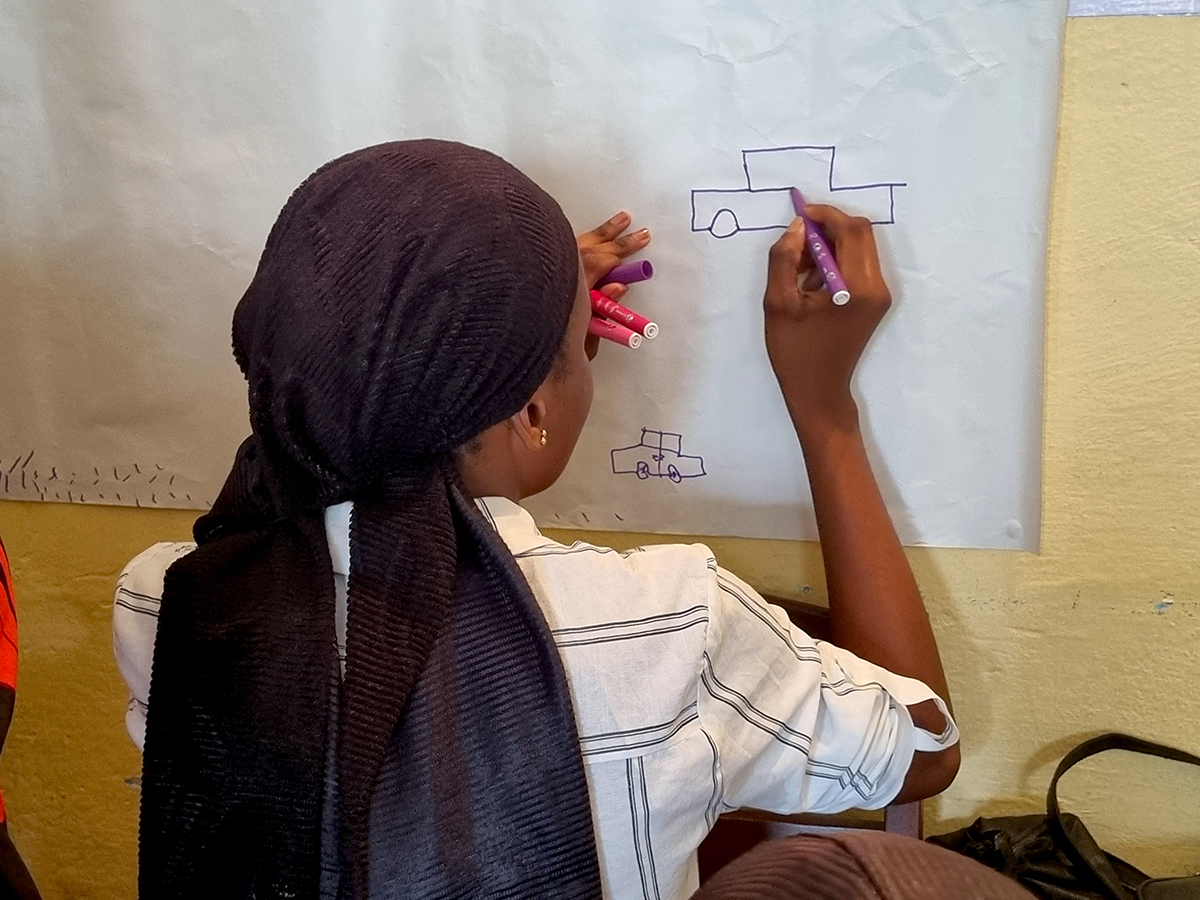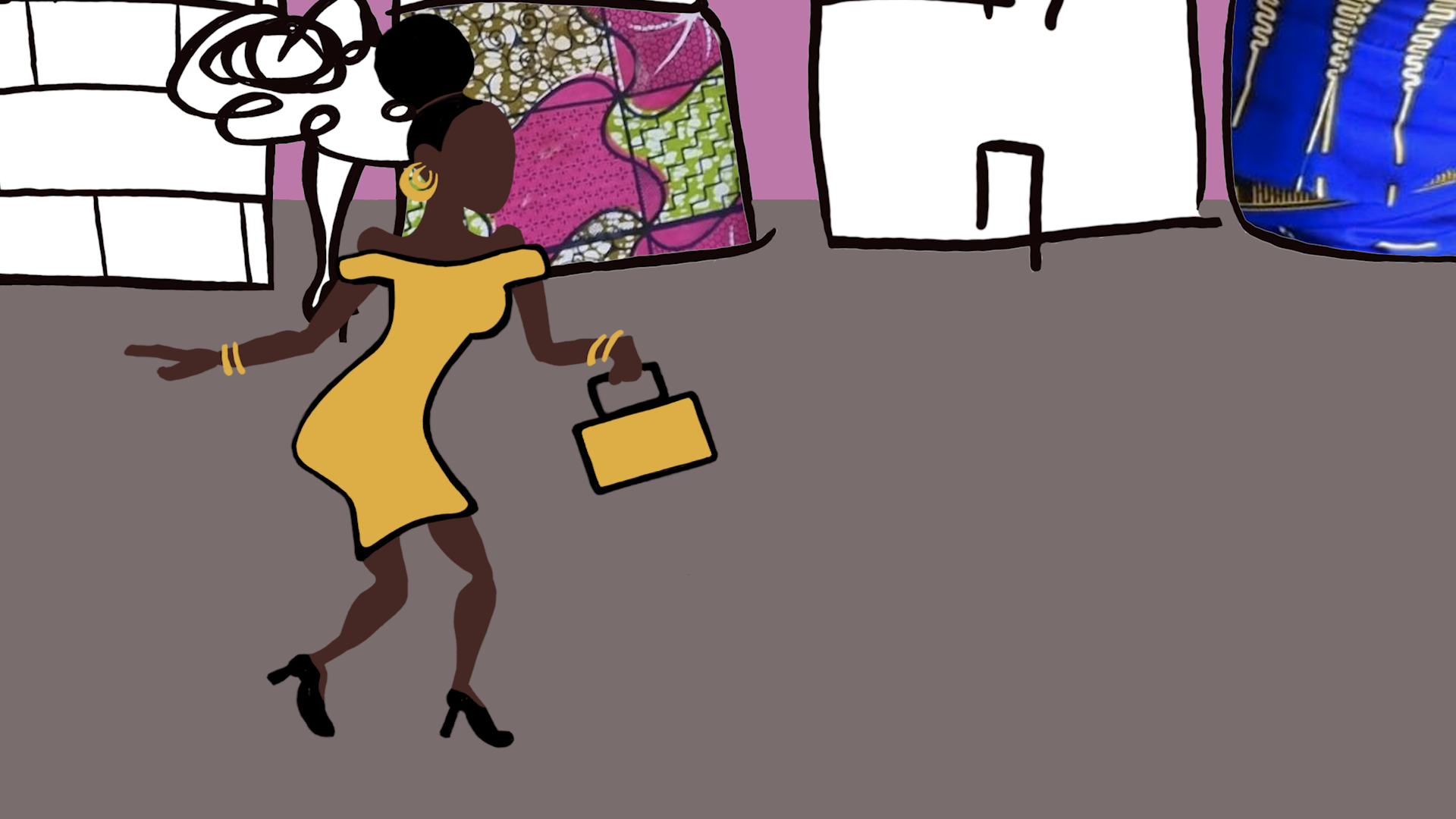New song and music video launched on World AIDS Day highlights the importance of centering places of joy and reducing stigma for communities impacted by HIV
Categories: Carmen Logie, Faculty, ResearchAn original song and music video, launched on World AIDS Day 2023, highlights what it would look like if the dreams and aspirations of sex professionals in Pointe-Noire, Republic of Congo, were to be realized. Created through participatory mapping workshops, the song and video, titled Esengo (“Joy”), exemplifies the 2023 World AIDS Day theme “Let Communities Lead.”
The project centered the knowledge and experiences of 100 sex professionals, who were invited to identify the places and situations where they experience a higher risk of stigma, sexual and gender-based violence, and barriers to healthcare. It also sought to empower the women through workshops on HIV and STI testing and treatment. During the participatory mapping exercises, the professionals were asked to share the places where they find joy and the factors that enhance positive life experiences and reduce risks, including those associated with HIV and other sexually transmitted diseases, in their work and lives.
All of this was ultimately translated into song.
The goal of the project was to better understand and ultimately support the resiliency of sex professionals in the region through stigma reduction within healthcare settings. (In Pointe-Noire, the term sex professionals is preferred over sex workers).
“We prioritized a strengths-based approach to the participatory mapping exercises in order to identify the knowledge, resilience, and collective resources of the sex professionals,” says Carmen Logie, a professor at the Factor-Inwentash Faculty of Social Work and principal investigator of the study. Logie is also a faculty member at the Centre for Gender & Sexual Health Equity at the University of British Columbia. “By approaching the research in this way, we were able to better pinpoint protective factors and focus on the changes that women actually envision for living a good life.”
 From 2022 to 2023, Logie and her collaborators hosted five two-day participatory workshops in Pointe-Noire. The workshops were led by a research assistant and trained peer navigators who also identify as sex professionals and are members of the Union pour L’Assistance aux Femmes Prostituees d’Afrique (UAFPA). Activities included (but were not limited to) drawing and collaging community maps to pinpoint places where participants experience joy and feel protected, places where they have access to safe and supportive health services, and places where they experience stigma. Participants also engaged in role-playing problems and solutions in healthcare and legal systems and brainstormed recommendations for how to reduce experiences of stigma in the sites they identified.
From 2022 to 2023, Logie and her collaborators hosted five two-day participatory workshops in Pointe-Noire. The workshops were led by a research assistant and trained peer navigators who also identify as sex professionals and are members of the Union pour L’Assistance aux Femmes Prostituees d’Afrique (UAFPA). Activities included (but were not limited to) drawing and collaging community maps to pinpoint places where participants experience joy and feel protected, places where they have access to safe and supportive health services, and places where they experience stigma. Participants also engaged in role-playing problems and solutions in healthcare and legal systems and brainstormed recommendations for how to reduce experiences of stigma in the sites they identified.
The songs created by participants highlight their dreams for reducing the stigma associated with the sex profession. They also underscore their dreams for improving prosocial behaviour toward sex professionals in their communities. Shared in the local languages of Kikongo and Lingala, and in some cases French, the songs not only provide the researchers with qualitative data, they also provide the UAFPA with powerful advocacy tools that can be used in the participants’ communities.
Two acapella songs were merged into one and professionally produced with instrumental accompaniment to create Esengo (“Joy”), with help from Mapumba Cilombo, a singer-songwriter, storyteller, and music producer with Congolese roots based in Cape Town, South Africa, who is dedicated to promoting wellbeing. The music video includes English subtitles and animations that incorporate drawings from the sex professionals who participated in the mapping workshops.
“The aim was to build a compelling visual narrative that could enhance the meaning and impact of the song, while meaningfully including creative expressions of sex professionals in Pointe-Noire” says Sarah Van Borek, a U of T postdoctoral research fellow at FIFSW and arts-based researcher who is working with Logie and her team on the project. A media artist and documentary filmmaker as well, Van Borek supported the participatory mapping workshops in Congo, helped to develop the song-making methods, and edited the Esengo music video. Background scenes were constructed from collaging together visual elements drawn by sex professionals in the workshops. Some of the colour and textures that make up the backdrop for the video were made by collaging photographs of the printed fabric of the traditional clothing that the participants wore.
“This song and music video will allow us to sensitize people to stigmatization, discrimination, and everything that goes along with it. And maybe collect funds to help the women,” says UAFPA Executive Director Franck Bibiche Mbende, who has been working to support sex professionals since 2007 . “We think this sensitization will reach right to the people who are at the root of the stigmatization. We will go far. The song can speak to everyone. The song, the music video, are very welcomed here and they will bring good things.”
To further highlight the needs and aspirations of the sex professionals who participated in the workshops, an advocacy video, titled Esengo ya Bosembo (“Joy of Equity”), produced with English and Lingala subtitles, was also created, emphasizing three key messages:
- sex professionals are human beings with equal rights to dignity, protection, and health services;
- elevated risks of sexual and gender-based violence and stigma targeting sex workers reduces sexual and reproductive health service access and uptake; and
- participatory mapping is a potential way to empower sex professionals to share their experiences and recommendations for change.
The project “Participatory StoryMaps for Reducing Sexual Violence Impacts with Sex Workers in the Congo Republic” was led by Principal Investigator Carmen Logie (Professor at the Factor-Inwentash Faculty of Social Work) and Co-Principal Investigator, Dr. Hugues Loemba (Co-Founder/Director of the Laboratoire d’Analyses Bio-Medicales HDL at the Polyclinic Fondation Marie Madeleine Gombes, Pointe-Noire, Congo).
The Esengo song and music video were made possible through support from Grand Challenges Canada, Canada Research Chairs, and the Social Sciences and Humanities Research Council (SSHRC).
Related:
- International Water Justice exhibit makes its Canadian debut
- 6 projects that highlight the imperative to “Let communities lead” on World AIDS Day
- Carmen Logie receives a CAHR-CANFAR Excellence in Research Award from the Canadian Association for HIV Research
- World AIDS Day 2022 Q&A: Professor Carmen Logie on HIV prevention, stigma and care among refugee and displaced youth
